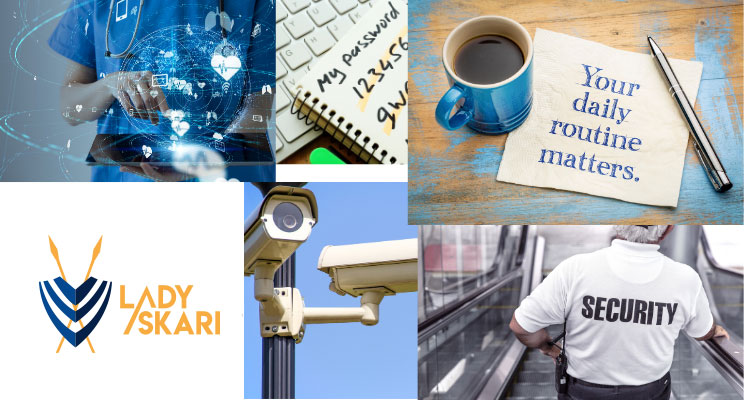This week is my last installment of personal and digital security tips for your 2020 travels. This time, I will focus on when you return from your travels. It’s important to remember that security does not end when you walk in your front door after a trip.
Digital Security Tips
1. Change Your Passwords When You Get Home.
After a trip, it is always advisable to change your password. Traveling is when your devices and personal information are most vulnerable. Even if you believe no one has gained access to your device or had access to your passwords, just to be safe, change your passwords. If you are like me, you may use the same password for multiple accounts and do not change them as often as I should. I recently traveled to Ethiopia and could not get my computer to connect to my phone’s hotspot, so I had to use the free Wi-Fi at the airport. When I got home, I changed the passwords on my accounts, which was annoying but I had to do it to ensure my digital security. Remember, free and public Wi-Fi spots are very insecure and can provide easy access to your computer or device.
2. Clear Browsing History And Cache.
Malware and personal data can sit in your cache, when you travel you are likely visiting sites you would not normally visit, so by clearing your browsing history and cache you are protecting your personal information and severing any link through the cache. This should not only be done after traveling but regularly. I recommend every month or anytime you visit an untrusted site. Most browsers today offer an incognito browser that does not save this information, so when you must visit an unknown site use that until you can trust or verify the source of the site.
3. Restore Any Files Or Data You Removed Before Travel.
Hopefully, before you traveled, you cleared any unnecessary files, data, and applications that you would not need while traveling. A big one for me is the outlook for my work email. Do you need an outlook on your computer while you are traveling? For any important emails you must answer (even though you should be relaxing while one vacation!) you can always check them through the browser. If you did remove things, now is the time to restore them on your device. As you are restoring them, this is also a good time to decide if you need them on your device or if you can just keep them backed up in the cloud or other secure storage device. The more you keep easily accessible on your devices, the more you stand to lose in a data breach.
4. Review Your Bank Statements.
Every Time you use your credit card you are exposed to identity theft. In some countries, where credit card security is not as stringent, people are more prone to identity theft. While on vacation, initial access to your information or data may have occurred so keep an eye out on your bank statements and make sure things match up to your actual spending. Theft can occur months after your trip, especially if you did not change your passwords or notify your bank of your return. The sooner you realize the breach the easier it is to fix. I once had a recurring charge on my card for 7 dollars a month. Because it was a small amount, it took me a while to realize and when I finally traced the charges, I came to realize it was something I signed up for on vacation as a one-time charge, but I was charged monthly. I could not get my money back and ended up losing over a hundred dollars for no reason. I was lucky, it could have been a lot worse!
5. Continue to Practice Good Digital Security Practices
Let’s face it, digital security is becoming a part of our everyday lives. I work in the security industry and my google news feeds pushes news related to cybersecurity every day. I was shocked to find out that on average, the FBI receives more than 300,000 cyber crime related complaints a year. You can not go around thinking “it won’t happen to me”. The more devices we accept into our lives that connect to the internet or other devices, the more vulnerabilities are present. Think about how many devices are in your house now. iPads, Phones, Smart TVs, Alexa, wireless cameras, Smart thermostats, and even video camera doorbells that sync to your phone. Each of these comes with their own vulnerabilities so please remember to practice good digital security in your everyday lives, not just when you travel.
Personal Security Tips
1. Check-in with your friends and family.
It might not sound important but if you told your family and friends that you were traveling then you should let them know you made it home ok. I know when I get home from a long trip, the last thing I want to do is to talk to my friends and family because they are going to want to hear the details of how things went, but there can be a simpler way to do it. With all the forms of communication today, you can send one message to everyone saying you have made it home safely and that you will provide them with the details soon. Then both you and them can get some rest.
2. Medical Check-up
Medical issues do not stop the second you get home. Some illnesses take time to manifest. Imagine if you traveled to Wuhan, China in the past month, I bet it would be a huge concern right now with the spread of the coronavirus, but there are other more common diseases that you could be infected with that you do not notice until you are home. Pay attention to any symptoms you notice, including exhaustion, and if they persist get checked out by a doctor. When you visit the doctor, make sure you let them know when and where you traveled along with any symptoms you have been feeling. The more information you give them the better. Malaria takes 10-14 days to manifest and if the doctor does not know you were in a malaria-prone location, they could misdiagnose and treat you for something that you do not have, further delaying proper treatment. Also, don’t be afraid to insist on tests or get a second opinion if you have a feeling something is wrong. Following a trip to South Sudan, I started to feel joint pains, had a headache and felt like I was hungover but had nothing to drink the night before so I thought I had malaria. By this point, I had experienced and been treated for malaria two times before, so I knew what to look out for. While back in the USA, I went to a tropical medicine specialist and they didn’t believe I had malaria because it is not common, but I made them do the test and not only did I have Malaria but I had a bad case. If I didn’t fight for myself, I could have gotten a lot sicker. As it turns out, I was the first real malaria case the doctor had ever seen, besides in medical school.
3. After Action Review
An After Action Review is a military term and process, but the point is that you should have some sort of review process following your trip so that you can think about some of the negative aspects of the trip and analyze why they happened and how you can do things differently for the next trip. This process does not have to be complicated or formal, but when you identify something you want to do differently, you should have a way to ensure you implement it for your next trip.
4. Continue to Practice Good Personal Security Practices.
Just because your trip is over, does not mean you stop implementing good personal security practices. Personal security awareness is something that is valuable in your daily life and should be practiced. Most, if not all of the tips I have shared with you over the past 4 weeks are relevant to your daily lives; traveling to and from your place of work, school, or in your daily activities. It is not like a light switch where you can turn it on or off, your mind must use it or lose the ability to pick up on the subtle cues that are around us every day. You
5. Start Planning Your Next Vacation.
You might ask yourself what planning your next trip has to do with security, but the earlier you start planning, the better prepared you will be for that trip from a security standpoint. It also helps reduce post-vacation blues. If you did your after-action review and picked up on a few things to do better on the next trip, start there and plan how you can implement these changes on your next trip…even if you do not know when or where that trip will be. Last time I went on a business trip, I forgot to pack my computer charger! When I returned, I created a packing checklist of things I need to pack for work trips and things I wish I had. I also took note of things I packed that I didn’t need and are a waste of space even though my justification for taking them for the trip was “just in case.” Remember, we are all human and make mistakes but remember to always learn from those mistakes so you can do better in the future
Thank you for taking the time to read my 2020 travel tips. If you didn’t get a chance to read each installment, go back and read the other 3 before you travel. Here’s to safe travels in 2020!

